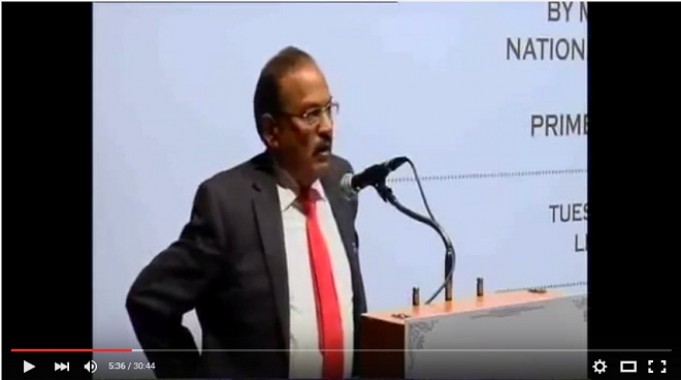National interest trumps media freedom
DOCUMENTATION
“State security, statecraft, and conflict of values”
The Lalit Doshi Memorial Lecture, August 5, Mumbai
In the wake of the turbulent national discourse which followed the execution of Yakub Memon, National Security Advisor Ajit Doval delivered a lecture in he which spelt out the theory of individual morality versus state morality and how the values of the former could not be imposed on the latter. He also spoke about how the handling of the media fits into statecraft, and later, on why media freedom cannot be allowed to imperil national security.
Because he advises the prime minister and the government, the Hoot is setting out the thread of his arguments and giving links to his lecture, and the Q&A session which followed. The comments on the media were made during the Q&A session. For reasons best known to the organizers, the video on YouTube omits those remarks. The full audio version is available here.
The points below have been taken from the videos of the main lecture and the subsequent points made during the Q&A session, as reported by PTI.
- An important leader (Shashi Tharoor was not named) said that state sponsored killings diminishes us all, reducing us to murderers. This formulation literarily makes us all coercive instrumentalists of the state. Or maybe even a private citizen defending himself is reduced to a murderer.
- Let us look at the expediency and correctness of the statement. This is a discourse about the conflict of values. Should there be a conflict between your own values and those of the state, how do you sublimate it, how do you resolve it?
- I recall that after 9/11, addressing the US Congress, President Bush said America values freedom. But should it come in conflict with the supreme interest of the state, it will be sublimated. The latter will prevail.
- When it comes to the exercise of the coercive instrumentalities of the state, there is a dilemma. You need your personal values for your faith system, your material benefit or anything that is only you.
- But the value system of the state is with the objective of protecting society and the core values for which it exists.
- Should there be a clash of values, then the higher value is that in which you have nothing at stake.
- People who came from the ballot box to make the laws could not always measure up to the confidence of the ability to protect people. Let human failings not be taken as failings of the system.
- Who will have freedom and upto what level? What are the costs and what are the responsibilities? The first duty of the government of India is to ensure its security.
- The days of statecraft through war are coming almost to an end.
- People are increasingly thinking it is not the most effective way. It has evolved into other tools of statecraft which have become quite important. Diplomacy, perception management, influencing the minds of the people, the media, soft power – there are other instrumentalities.
- Instead of war there is cold war, a proxy war, covert wars.
- War is more transparent. But war through other means is much more dicey and more difficult to fight.
- The real power in coming times will be wielded by people who can make you think in a way which is in their interest.
- In reality there is a parallel quality to values. Individual morality cannot be inflicted on the larger interest of society.
- Therefore the formulation that any instrumentality used by the state reduces it to the status of a murderer is totally untenable.
- The media is very interesting entertainment for me. Maybe what they are advising is right, but then how wrongly can right be projected and people remain disinformed?
- Probably they (the media) also have got their own compulsions. You are writing a newspaper which can sell. You have a TV programme for TRPs. I know my priorities. Why should I try to impose mine on them?
- My point is that, at some point, the national interest is supreme for all of us. Either we stay together or sink together. The day we sink, all this freedom of the press will also sink.
- Don't do anything that will create cynicism within the ranks of the people. Make a strong nation. Let us keep our communities together. The cynicism that is sometimes created leads to loss of respect and faith and confidence in all institutions, which is very bad for a nation.
- It is a vicious circle. You write and people read it. People read it and so you write more of it. What about serious journalism?







